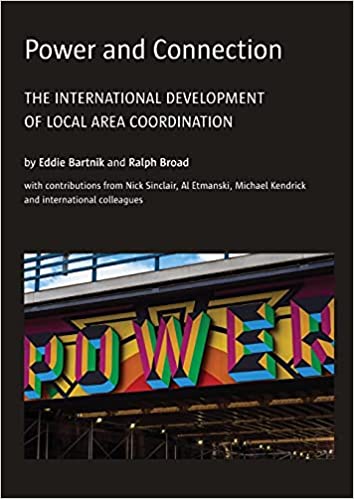International leader s of Local Area Coordination Eddie Bartnik and Ralph Broad have co-authored a new book “Power and Connection” in collaboration with key contributors including Nick Sinclair and the English and Welsh Local Area Coordination Network.
s of Local Area Coordination Eddie Bartnik and Ralph Broad have co-authored a new book “Power and Connection” in collaboration with key contributors including Nick Sinclair and the English and Welsh Local Area Coordination Network.
With a focus on the last 5 years of international development, Power and Connection celebrates and brings up to date three decades of learning, evidence and stories speaking to the efficacy and positive impact of Local Area Coordination.
The book reflects on the Local Area Coordination journey, philosophy and approach since its conception in Western Australia in 1988. Designed and built on a core vision, charter and set of principles, Local Area Coordination aims to re-balance our public service support systems, stimulating a shift from rationing funding and crisis management towards capacity building at multiple levels. The book outlines examples of how this has been achieved through intentional and supported design, collaborative leadership and of course the work of Local Area Coordinators themselves.
Power and Connection celebrates how in many parts of the world Local Area Coordinators are now an approachable and available resource to all people in the communities of place they serve, including those already accessing services, those who may be approaching the system for support and those at risk of needing services if things don’t change. It explores how by working to a particular approach (based on a set of principles and a series of connected strategies), Local Area Coordinators are helping people identify their own individual, family and community gifts and solutions before looking at what funded supports and services (if any) could be complementary to their good life.
Throughout the book, the authors assert the Local Area Coordination logic of avoiding deficit focussed assessments, providing time limited support and signposting for siloed interventions. Instead, they highlight how the radical and alternative Local Area Coordination approach is taking the time to listen, build trust and understand the whole picture, before helping in a way that builds capacity, connections and resilience at the individual, family and community levels. Over time this evidently helps people overcome any barriers to achieving their good lives and move from the fringes to the centre of their communities, making contributions as valued, connected and included citizens with their Local Area Coordinator locally available and present alongside when needed.
Power and Connection also outlines how by focussing on building these meaningful and hyperlocal connections, Local Area Coordinators are also playing a useful resourcing and bridging role supporting local organisations and groups of community members to develop their civic institutions and local activities. This aspect of the approach is supporting truly inclusive community development, helping places to become more connected, inclusive, sustainable and self-supporting. This is reflected in the Local Area Coordination charter or mission statement which fundamentally asserts partnership working with people leading from the centre of their own lives and the Local Area Coordinator helping to build positive and sustainable relationships in all directions.
The evidence, commentary and stories outlined in Power and Connection highlight how this very human approach has led to significant and life changing outcomes for people and their families, for local communities and for the wider service systems surrounding them. For the latter, it shows how Local Area Coordination is contributing to a reduced demand on our service systems whilst aligning strategic opportunities for collaboration across services and sectors, developing more creative and efficient use of public resources. It also points to evidence where it is creating space and opportunities for genuine co-production and system transformation.
Power and Connection explores the work done to date on the Local Area Coordination journey and poses some key questions for our future as we begin to make sense of our post Covid-19 world and the challenges and opportunities we are presented with today.
The book is a must read for local and national policy makers, system leaders, community representatives and citizens alike who believe in the power of connection, community and relationship building and who seek to influence a more human orientated public service system that helps shape the conditions needed for the good lives and outcomes we all want to see.
Join the launch event on 2nd November, 8 am- sign up for your free place here!
If you are interested in finding out more about Local Area Coordination – join us for our webinar What is Local Area Coordination? 11th November 1 pm – 2 pm – sign up here!


